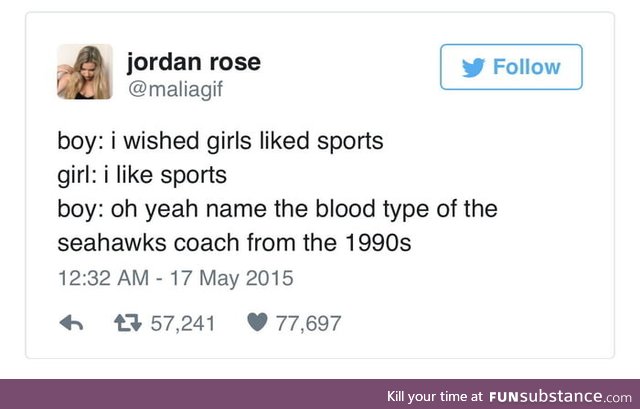Comments
Follow Comments Sorted by time
guest_
· 6 years ago
· FIRST
On the one hand, there could simply be a difference in what they mean by “like.” If he means “like sports (as much as I do, in the way I do.)” then he may not consider her as “liking sports.” Many fans do this when others say they “like” something the fan does, a Star Wars fan may get defensive when someone says they like Star Wars, but don’t know the name of the person who designed the reactor of a star destroyer. On the other hand- it’s fair to say that women more often find themselves facing unsolicited and conversationally abrupt “challenges” to prove they like a thing like cars, games, sports, etc. than men. It’s more tgevusual case a man will be taken at his word and possibly challenged if or when he says something to discredit his fan hood, whereas a woman will likely meet default skepticism before the subject has been discussed naturally. So I’d have to agree in my experience that this is mostly true.
14
xdmaniac
· 6 years ago
I believe it's mostly caused by women in the past calling our hobbies "nerdy", "stupid", and "immature". Leading us to mistrust women who suddenly reveal they like the thing. Considering there are women who pretend to like things for attention it further reinforces this assertion. Making it harder for women who are genuine fans to be taken seriously. The media has basically been programming the Non-popular stereotype males to believe women dislike them and that a woman who likes what the like is either disgusting or a super-rare case for as far back as the mid 80s. As soon as video games became considered niche instead of popular this problem was created. Think about how many tv shows or movies you've seen where the only kid that plays video games or is really fanatic of something is the loser and the girls in school revile him. THIS is where the problem originates and it's gonna take awhile before the people who grew up on this media get it out of their heads.
guest_
· 6 years ago
I’d agree that his is a contributing factor, but not the origin. If we go back historically, we can see that not all women have been against traditionally “male” hobbies, in fact traditionally most became “male hobbies” because women were outright forbidden or excluded from them. The standards of being “ladylike” or “feminine” have been pushed for a long time. Through much of society in so called “civilized” cultures, women were pretty much barred from activities requiring physical exertion like sports or manual labor. Often being barred from even spectating on fears of what thoughts they might get. Women were not (and as a long time insider I can say still not as of the 2000’s) welcomed in the industry. Girls weren’t “supposed to” play with video games, and as you say- in the earlier days only “geeks” and the like did. But it became acceptable especially for children, much as grown ups might be considered odd at times past for playing with dolls.
guest_
· 6 years ago
I posit the origin goes back much further to an observable fact through history and across the globe even today, that women tend to be excluded by society, a society which was and is primarily administrated by men- at their will. Like most exclusion I have to conclude it is primarily based on a desire to limit competition and where practical, ensure a greater chance of personal gain, where conceptual, to preserve ego through an idea of superiority. That same superiority that is served when we “call out” a person saying they like a thing, either as a phony or as not as skilled or knowledgeable as we are.There are whole papers on the “likes it before it was cool” phenomenon, and why people react that way. I suspect that plays a role as well. But origins? No. I think the origin is pretty clear when we consider things women still aren’t allowed to do in 2018 in parts of the world. That is not limited to a time or place, it is fairly universal.
funny_steph
· 6 years ago
It's AB negative












